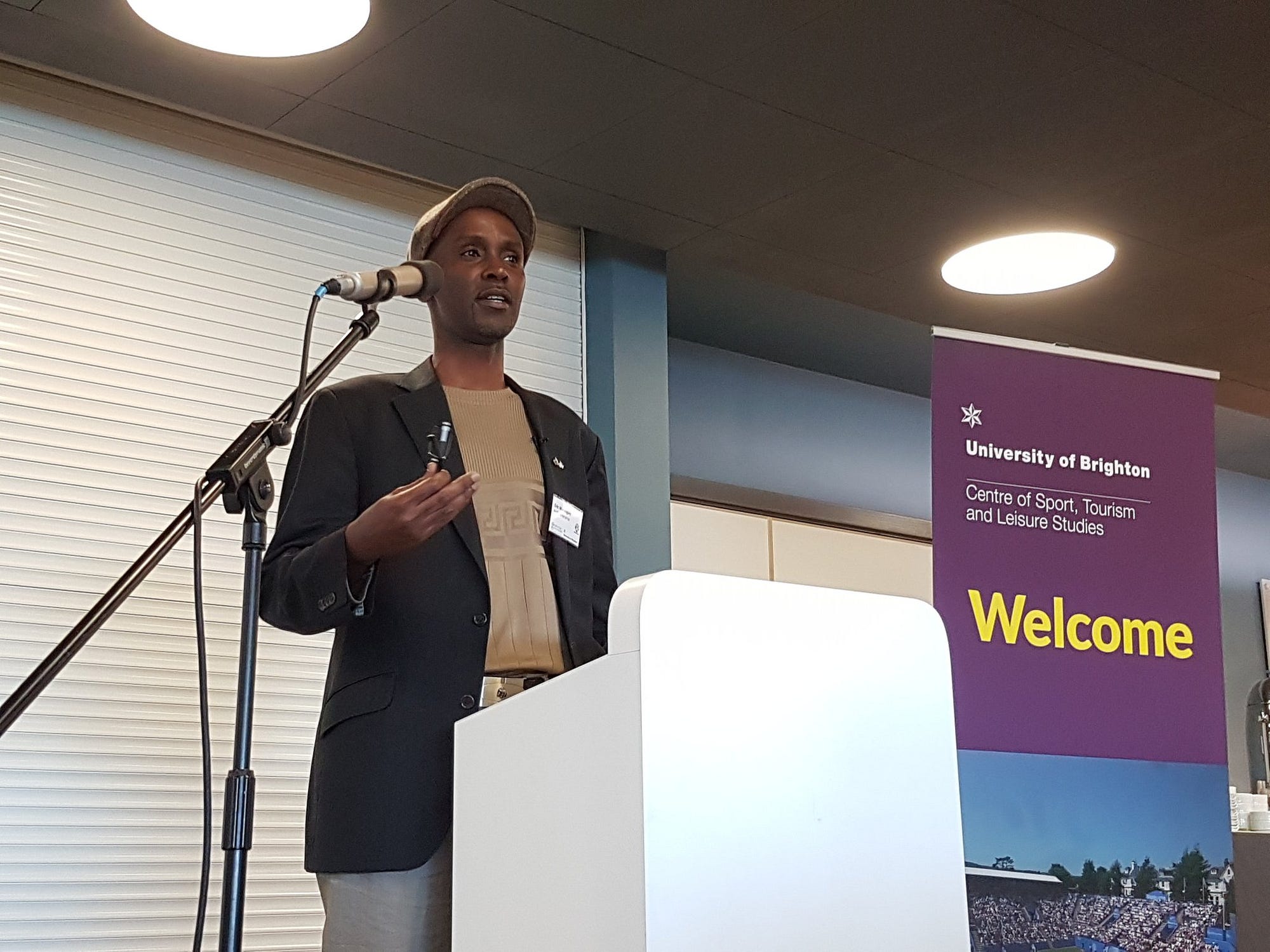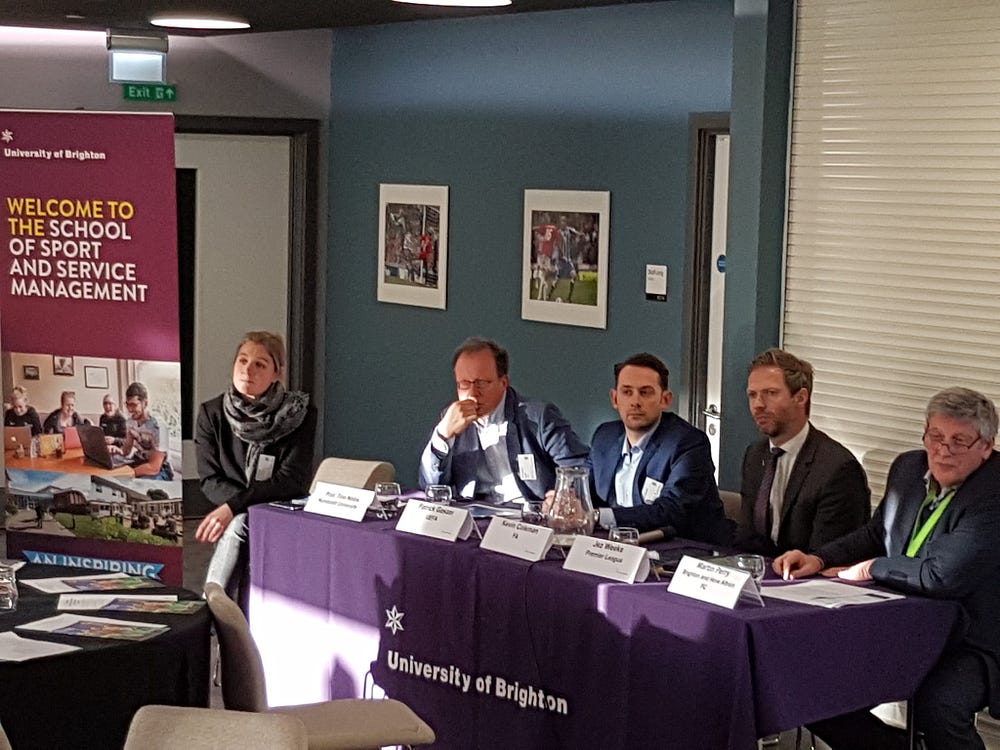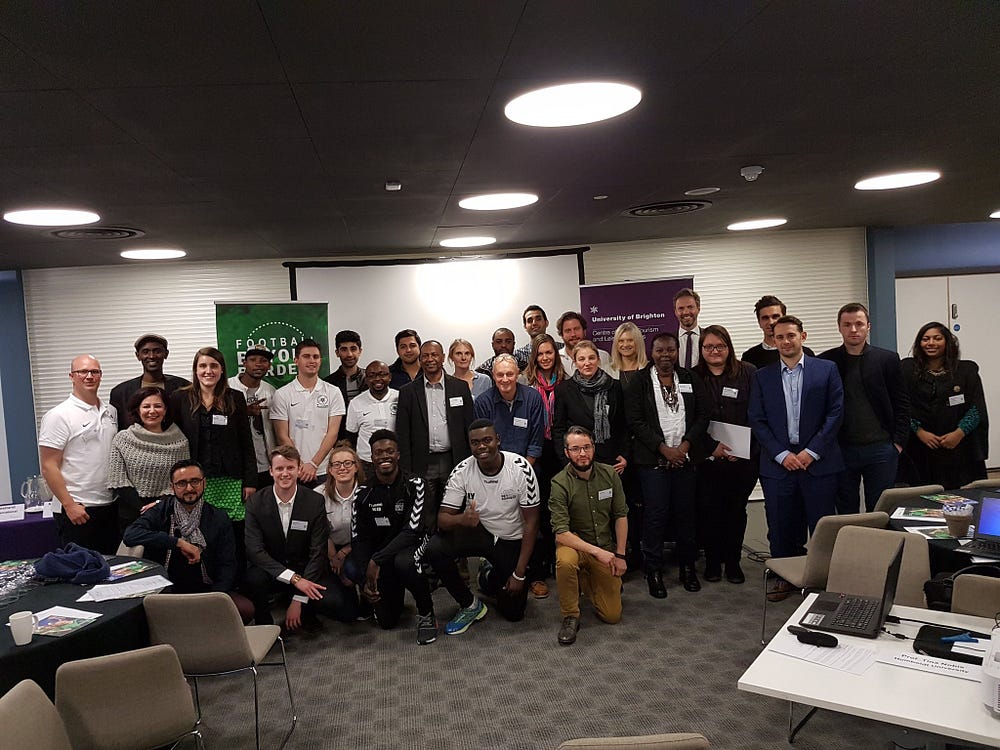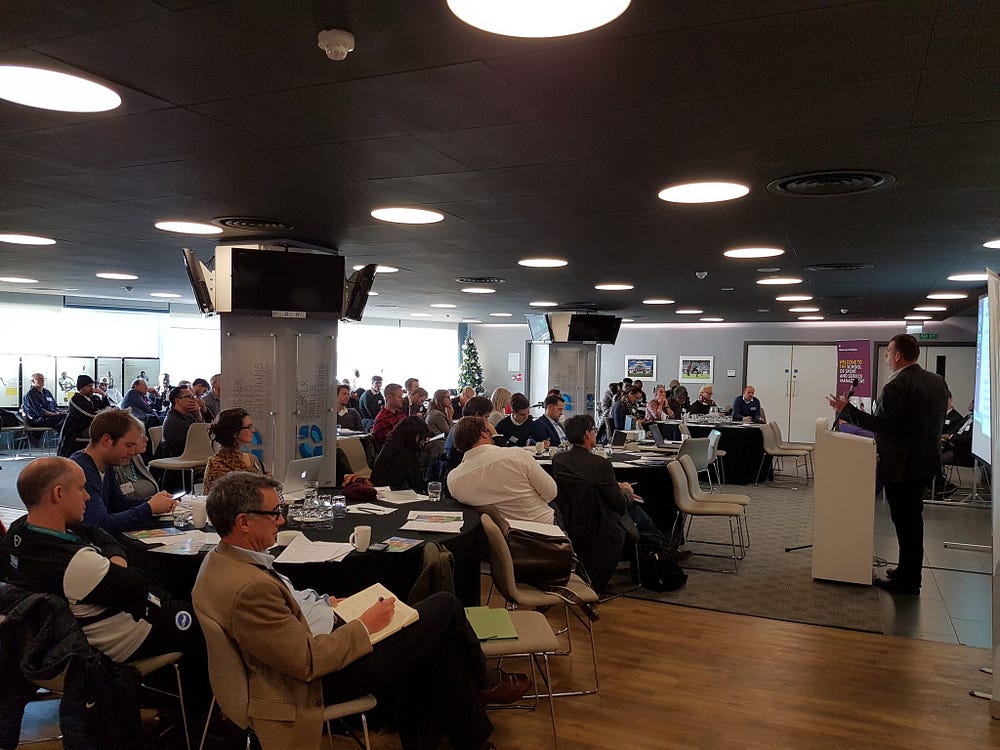
FHPU founder Eric Murangwa Eugene was invited by the Brighton University to be the keynote speaker at the “HOW FOOTBALL CAN SUPPORT REFUGEES GLOBALLY” conference organised at American Express Community Stadium in Brighton on 25 November 2016. Murangwa joined lecturers at the University of Brighton, local politicians and members of clubs, governing bodies and various interested parties, like voluntary organisations and NGOs that works in the sector of Sport for Development and Peace.

In his event opening speech Eric Murangwa Eugene, founder of Football for Hope, Peace and Unity and Survivors Tribune talked about how he came in the UK as a refugee after the genocide in Rwanda and detailed how football literally saved his life. As a professional player who played for the Rwandan biggest football club Rayon Sports and captained the Rwandan national team, Eric’s life was spared when gunmen realised who he was. Later, he was protected by members of his football club and a board member helped him to escape. Eric’s powerful speech set the theme for the event and reiterated the unifying aspects of football.

Conference delegates

Learn more here:
You can read Eric’s full transcript speech below:
Football My Saviour:
Sports had always been a crucial part of Rwandan society, from approximately 1600–1900 Rwanda was a warrior country known to be conquering territories within the region.
When the colonial powers came into Rwanda in early 19th century they found a much organised sporting nation and introduced football as a sport for the first time.
Rwandans embraced the sport and made it into their own, sports teams formed a strong following that used to follow the team around and were very fanatical but it became a way of life for many people.
The influence of football in Rwandan society continued throughout and played major roles both socially and politically.
Ever since I was a young boy football was always very important in my family because my father was, and still is, a very keen football fan who supports Rayon Sports Football Club.
Football to me is a symbol of life as it saved my own life during the 1994 Genocide against the Tutsi in Rwanda. Rwanda’s biggest football club, Rayon Sports, took me on, giving my life purpose. I started out collecting stray balls and standing in for the goalkeeper
My passion for football would later save my life.
In April 1994, I was the goalkeeper for Rayon Sport, one of Rwanda’s biggest football teams. When my teammates and I went for training at Mumena Stadium on April 6, it was just another normal afternoon in Kigali, although a normal afternoon in Kigali did include explosions, grenades and shootings. Still, I didn’t have the slightest idea that this day would be the last day of my old life, and the worst in Rwandan history, a day to reduce every single Rwandan to tears.
In the early hours of April 7, I was woken by the sound of bullets and bombs coming from all corners of the capital. Soldiers who had come looking for weapons swamped my neighborhood, and about five soldiers broke into our house, intent on killing us all. Then one of the soldiers recognised me as ‘Toto’, the nickname by which I was affectionately known by fans of Rayon Sports.
A few weeks before, my team had played in CAF — the Confederation of African Football Cup — and had eliminated El Hilal from Sudan. For about three hours this win was a very significant moment in Rwandan history: Rwandans were united, Hutu and Tutsi alike sharing in the joy of beating one of Africa’s footballing giants. So sitting there in my living room, gun in hand, all this soldier wanted to do was talk about the match. And, in the end, he spared my life.
However, the situation in the country had become more desperate and Hutu killers were losing control of their territories, the government had fled the city and it had become lawless.
As Rwanda descended into total chaos and was abandoned by the international community, sporting solidarity became a matter of life and death. My Hutu teammate, Munyurangabo, made sure that I and a number of other people were all looked after, providing us with protection, supplies and, most of all, hope. When we were hungry, he went out to look for food. When we were in danger of being discovered, he got information that enabled some of us to escape to the safe area of the city. When we were threatened, he negotiated with killers, and in my case, he even paid his own money to free me and some of my colleagues from the clutches of the Interahamwe militias. And out of more than ten people who sheltered at Munyurangabo’s house, only Munyurangabo himself lost his life.
Munyurangabo was not a Tutsi. He was not even a so-called ‘Tutsi sympathiser’. He was just an ordinary man who happened to be an incredible human being, with courage and humanity that most people inside and outside Rwanda lacked, at a time when people needed it most.
Inspired by Munyurangabo, and remembering how Tutsis and Hutus had briefly been united by the victory over El Hilal, I realised that sport had a tremendous power to unite where there were divisions, to heal where there were wounds.
Two months after the genocide life was far from normal but thinking sport could provide an escape from the horrors of Genocide I decided to re-form Rayon Sports Football Club.
The squad had been decimated and the pitch was ruined following a fierce battle between two opposing armies.
Against all odds we succeeded and football began to play a part in uniting Rwandans.
I owe my survival and that of my family to the protection I received from fellow members of the Rayon Sports Team.
In 2010, in tribute to Munyurangabo’s courageous humanity, I founded ‘Football for Hope, Peace and Unity’ (FHPU), where the beautiful game plays a beautiful role, transforming communities through the power of sport. With our key values of fair play, team spirit, discipline, understanding, tolerance, respect, resilience, inclusion, communication and togetherness, we have a long-term vision to promote unity and reconciliation in Rwanda and beyond, so that what happened to us can never be allowed to happen to anyone ever again.The humanity and courage shown by my Rayon teammates was a significant lesson in the power of sport and is the inspiration behind FHPU’s belief in football as a highly effective tool for achieving sustainable social change.
Twenty three years after the horror of the genocide against the Tutsi, Rwandan society is rebuilding itself. At the heart of this complex and fragile process, the practice and teaching of football is helping to build and strengthen the bond of new generations.
Rwandans want to show the world that together they can restore pride and joy to a people who for a long time have been plagued by hatred and racism.
Football matches for reconciliation are even organized to facilitate the return of the prisoners released on their hills. Today, sport and football in particular, plays a huge role in the process of rebuilding the country.
We have decided to look at the future and chose to dedicate our efforts on the process of reconciliation and reconstruction of our nation and the world at large.
In 2014 FHPU introduced the One Game One Goal One Community project, weekly football sessions that provide young people in the UK with the opportunity to interact and discuss issues specific to their community. Many of these young people have since become key players in matters that are important to their communities and beyond. For the last 3 years these same young people engaged in debates facilitating understanding of issues such as Genocide, Holocaust, and the global refugee crisis by means of workshops, film screenings and public gatherings. We are proud of these young people and what they have achieved, and what they continue to achieve.
We have established partnerships with different SDP like-minded organisations such as Coaches Across Continents (CAC) and are involved in specific football programmes tackling issues such as conflict prevention, peace-building, female empowerment and health awareness (including HIV) both here in the UK and in Rwanda. FHPU’s collaboration with CAC commenced in 2014; together we are developing ways that empower Rwandan communities to use football as a means of promoting social cohesion, nation building, and improving the quality of life of all Rwandans. To this day, the PlayforHopeRwanda20 coaching programme has been able to train over 600 local community coaches and is impacting thousands of children across the country. Going forward FHPU plan is to start a new programme “FHPU Sports Academy” designed to offer even higher quality training to better equip sports coaches with the skills and knowledge to teach/coach about social issues, personal values, behavior, and attitude — as well as sport skills — for men, women, and children across Rwanda. This is something we hope we can collaborate with other organisations like our host today “Football4Peace”, and so many of the inspiring speakers on the panels throughout the day. The aim is to build a network of coaches capable of simultaneously delivering social values and sport skills which will contribute towards facilitating community-led successes in the following areas;
Social Community Development — Including Social Inclusivity, and Fighting Discrimination and Prejudices in all forms; racism, gender inequality, homophobia, religious intolerance, ableism, and helping to bring an end to issues that lead people to become refugees.
• Individual Development
• Physical and Mental Wellbeing
• Professional Sport Skills
• Economic Development
Among many of our other goals there’s a need to develop a collaborative programme of activities to use sport for social change, storytelling and, in particular, refugees inclusion in sport to help deliver social impact within communities across the UK and in other conflict affected countries across the world. In the future we would also like to introduce our sport for social impact within schools across UK. We believe we can make a huge impact on how young people think and act towards serious issues of extremism and prejudices. Our soon to be “iPlay4Refugees” programme through communities will engage young refugees in the UK to take action and become decent citizens and active members of British community at large.
However, we know how difficult and challenging it is continuing to manage and deliver programs on shoe string budgets and grants for small but active organisations such as ours, although there is a lot of goodwill there, there also needs to be long-term commitment and support from these organisations.
We need funds to develop models and train more coaches on how to use sport and football in particular as a tool for social impact and we also need to continue building partnerships with like-minded and good hearted people because without these partnerships our work would not be possible, so I encourage everyone here in the coming days to pick up the phone to each other or drop an email in the coming days so that, together through partnerships, we can work to use sport to help refugees globally and change lives using the power of beautiful game.
Thank you very much.
Eric Murangwa Eugene
Founder of Football for Hope Peace and Unity & Survivors Tribune.
Please do continue to follow us on social media, using these links and share anything that you like or inspires you!




no replies